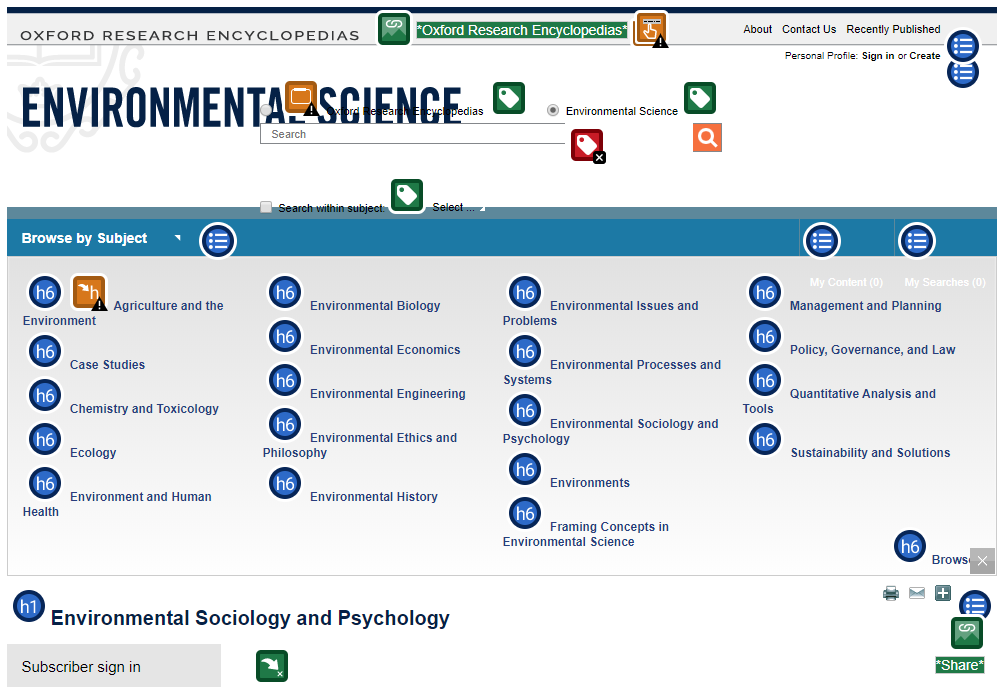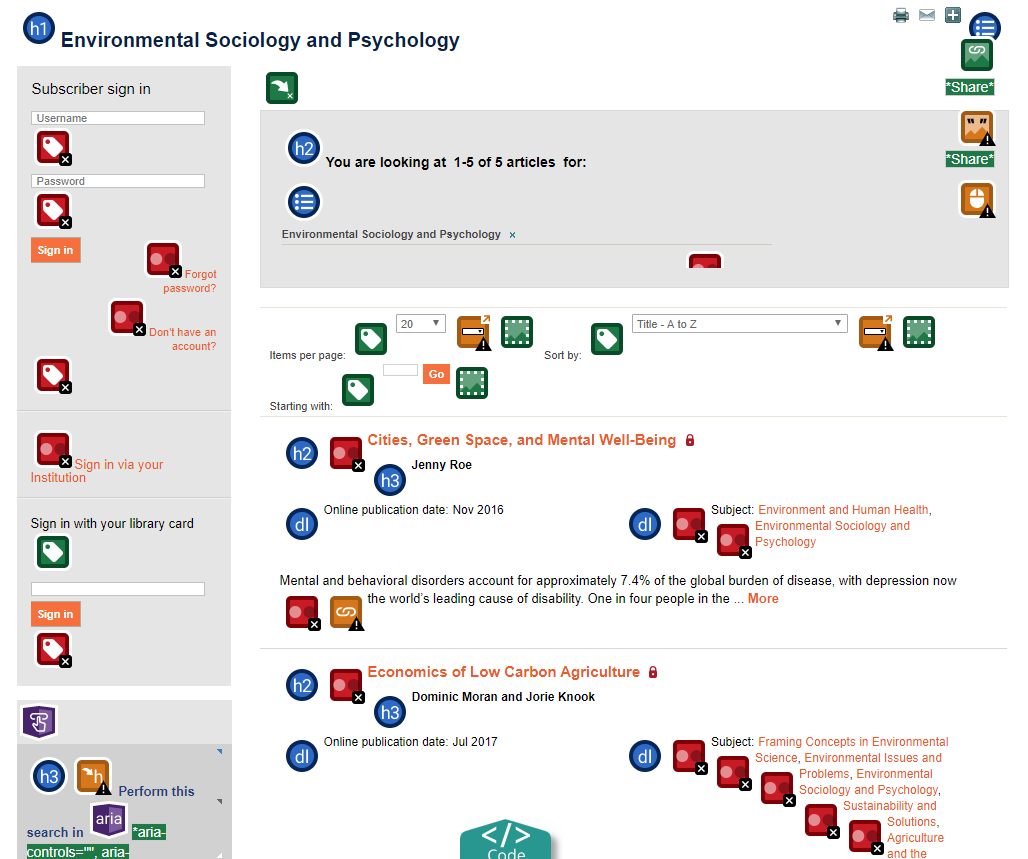Oxford Research Encyclopedias
(Weighted Total)
(Quality, uniqueness, reliability, and appropriateness for community college audience)
(Usability, customization, mobile supported, lack of problems, print/download/email content, citation formatting)
(Value and terms of use)
(Compliance with standards)
(For administrators and users)
Method
Review
Introduction
Oxford Research Encyclopedias offer “comprehensive collections of in-depth, peer-reviewed summaries on an ever-growing range of topics.” Entries are written by professionals in the field and represent 25 topic areas, including politics, science, literature, and more. Two formats are present: full articles & summaries. In one example, a PDF of a full article ran 30 pages in length. Another was 20 pages in length. Full articles make up a majority of the content - 14,000+ articles to date. For the latter, an entry on the same topic ran 3 pages in length. However, among a sampling of summaries (209 available at the time of this review), we found them to be generally one page in length. When they say “World-class experts give readers an overview of a subject that they can understand in half an hour of reading or less,” they are probably noting the summaries.
This content falls into the unique category of being academic without necessarily being “peer-reviewed.” The fact that this database bills itself as being “peer-reviewed” is a bit misleading, as it is not typically the type of peer review that is being requested in assignments. The depth of the articles is impressive, but the obscurity may make the topics less accessible than a typical reference entry. The reference articles provided are lengthy and appear to be of good quality.
In thinking through the kinds of research assignments we see in our community colleges, we wondered how these in-depth encyclopedia articles would help our students. In a research paper exploring a topic in a transfer level english course, a student may be required to write 8-12 pages, and may be asked to include a minimum number of sources. If said student was instructed to explore their topic in a minimum of 8 sources, would they best be served by an in-depth encyclopedia article as long as the majority of what the OREs offer? The articles are thorough, and one could get an excellent education on a topic using them, and they feel trustworthy, but the angle of the articles feel niche enough to where these might not be appealing to a large swath of our community college students (based on their common research assignments). A better use case might be if these were used as a content item by the instructor - that is, if they assign a full article for reading by the entire class on a topic.
One of the benefits of these articles is that they do provide an in-depth overview of a specific topic, but is written in a way that is accessible for first and second year undergraduate students. The language used is much more readable than a scholarly journal article.
To get a sample of the style of an entry, please see the “unlocked” items on the site (which are entries prepared for encyclopedias under development).
Interface
Navigation between subjects along the top are easy to use, and if the Research Encyclopedia exists for a subject area, it will further subdivide into narrowed topics. The Tab key on a keyboard works to open and close the “Browse” subject menu. You can easily cross-search the encyclopedias using the Search box as well. A list of search results shows the title of the entry, the author, the date, the encyclopedia the entry belongs to, and a part of the entry.
Once you are within an entry, the search box changes from a database search to a subject specific search (with radio button options to switch between options). This is an interesting feature, though it defaults to the topic the entry appeared within, and this may be confusing to students who might be used to a “OneSearch” experience.

Within an article, a user can jump between headings using links along the upper left side of the page, which may help students identify the most relevant section for their research purposes. Rather than identifying "sources" for the article, the lower section displays ideas for "Further Reading."
The search itself appears to provide irrelevant results. At best, some of the results are wildly tangential. An example of this is the search for “climate change,” which pulled up the following first three results: “Climate Change Communication,” “Celebrities and Climate Change,” and “Climate Change and Migration.” While it’s clear these are pretty off the mark for the expectation of a reference work on Climate Change, to be fair, these also sound like really interesting articles that would be difficult to get information on with a simple search of most databases. A “Climate Science” encyclopedia is offered, but science related articles did not rise to the top of the result list.
Mobile Friendly
Initialization and Administration
Access to this resource is enabled through IP authentication.
Integration with Alma/Primo
According to the 'Alma Community Zone Collection List,' 25 portfolios are present for the Oxford Research Encyclopedias. We are unsure how deep the search will go in Primo.
Accessibility
WAVE Web Accessibility
Homepage issues include (10 errors, 6 contrast errors, and 11 alerts):
- Missing form labels
- Empty links
- Contrast errors (color)

Article Level page issues include (14 errors, 39 contrast errors, and 31 alerts):
- Missing form labels
- Empty links
- Contrast errors (color)
- Missing Fieldset and Legend
- Skipped heading level
- Suspicious Links


Readability Scores
Overall, readability scores are above first year undergraduate reading level.
“Attitudes Toward Women and the Influence of Gender on Political Decision Making” (Grade: D)
Flesch-Kincaid Grade Level 13.9
Gunning Fog Index 15.2
Coleman-Liau Index 15.0
SMOG Index 16.3
Automated Readability Index 15.4
FORCAST Grade Level 12.4
Powers Sumner Kearl Grade 6.9
“Accountability in Journalism” (Grade: E)
Flesch-Kincaid Grade Level 16.4
Gunning Fog Index 18.9
Coleman-Liau Index 15.5
SMOG Index 18.3
Automated Readability Index 17.4
FORCAST Grade Level 12.4
Powers Sumner Kearl Grade 7.6
Rix Readability 13
Raygor Readability 13
Privacy
The privacy policy indicates that they use some personal information with consent, but that users may email them to withdraw consent. As of November 2019, they do not sell personal information to third parties.
Support
Cost
Individual subject collections may be subscribed to for approximately $1000. The entire package of 25 subjects is available for approximately $3500.
Competition
Recommended Improvements
ConclusionOxford Research Encyclopedias includes high quality, in-depth articles written by experts in their field at a level that eschews the “scholarly” tone. The scope of the articles is much more specific than an encyclopedic source normally is, but when searching, the narrowness of these articles became problematic when thinking about the expectation from a beginning researcher. The articles did not come up in the search results as expected. While we do not recommend this as an electronic encyclopedic resource for a community college library, it may work well as an OER resource for faculty looking to provide shared course readings.
If you have any experience with this product, please leave a comment and rate its appropriateness for use in a community college environment.
† The offers and trials information are password protected. Actual prices are confidential between the vendor and the consortium.
For access contact Amy Beadle, Library Consortium Director, 916.800.2175.
Add new comment